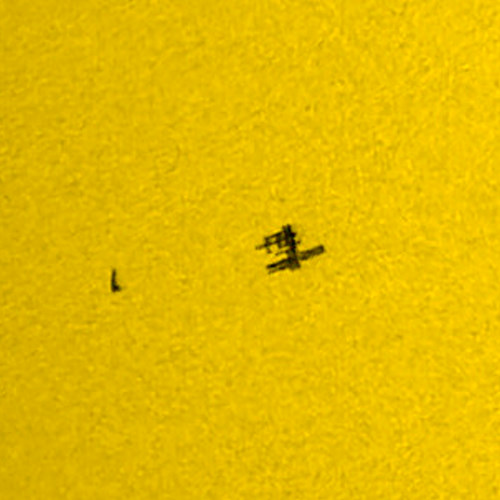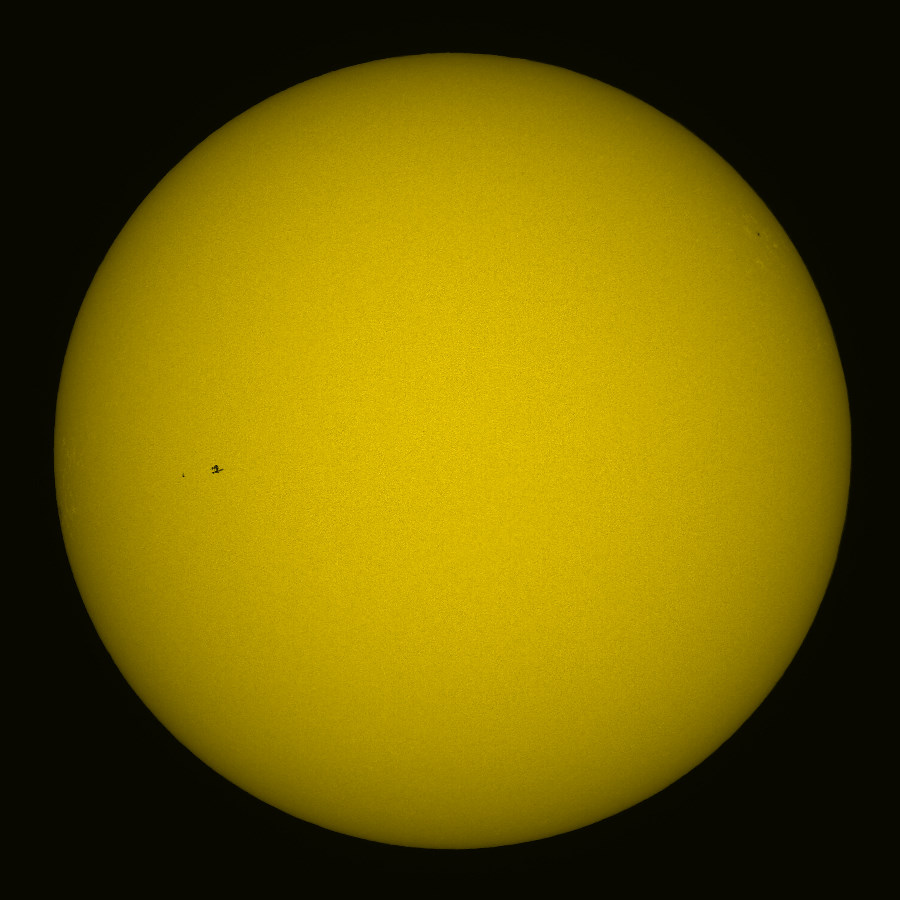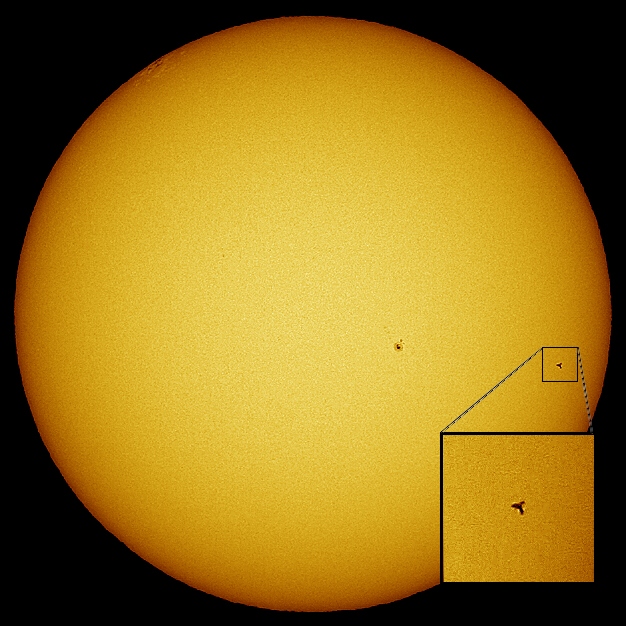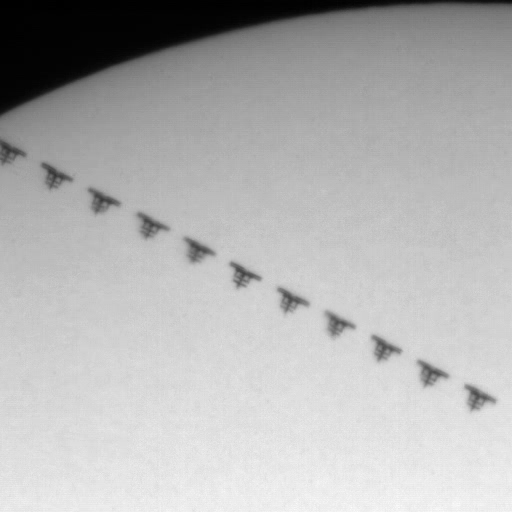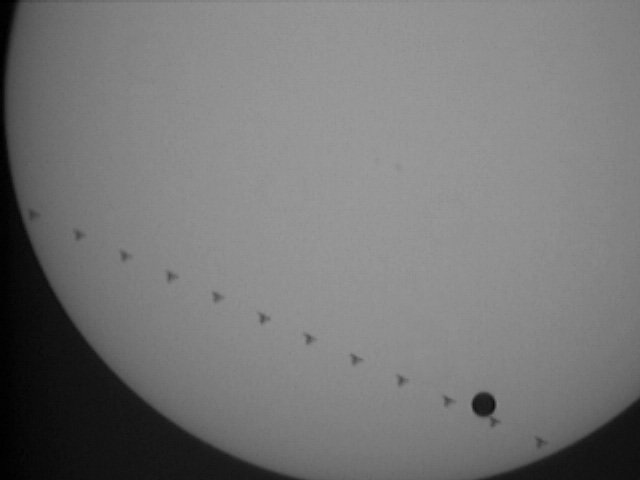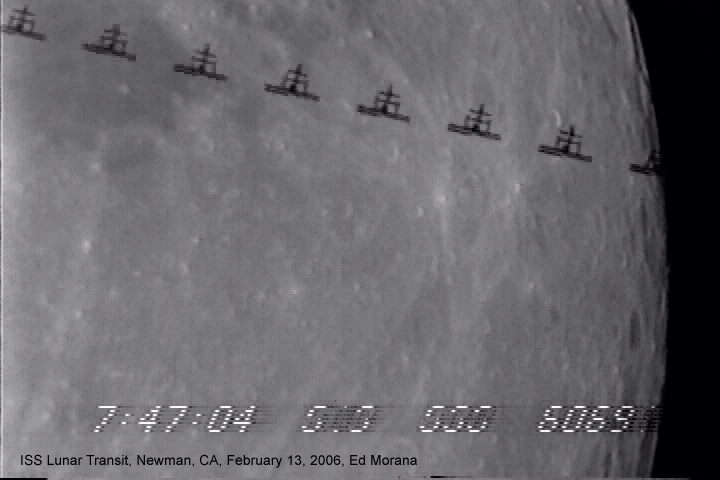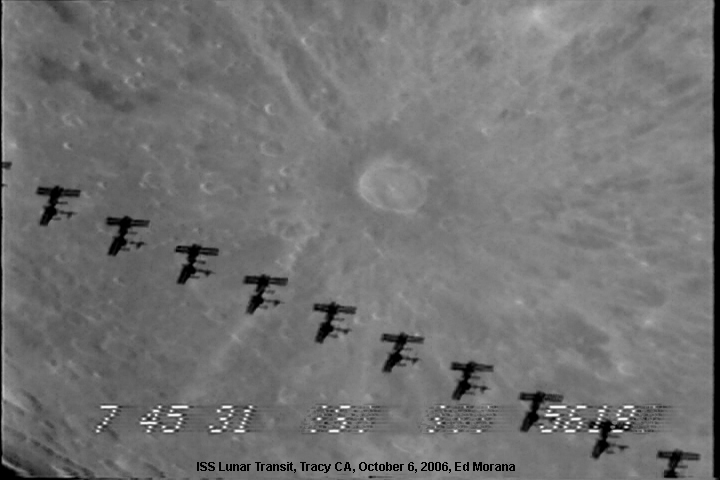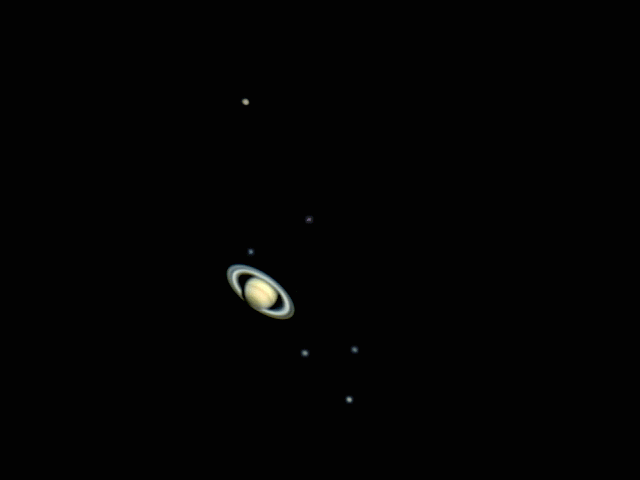|
|
|
| The following collection of amazing images have bben taken by various Amateur astronomers. These images are copyrighted and used here by permission. Links to their respective websites are provided below. | |
|
Thierry Legault/Eurelios September 17, 2006 ..
Image of the solar transit of the International Space Station (ISS) and Space Shuttle Atlantis (50 minutes after undocking from the ISS, before return to Earth), taken from the area of Mamers (Normandie, France) on september 17th 2006 at 13h 38min 50s UT. Takahashi TOA-150 refractor (diameter 150mm, final focal 2300mm), Baader helioscope and Canon 5D. Exposure of 1/8000s at 50 ISO, extracted from a series of 14 images (3 images/s) started 2s before the predicted time. For more information on this
fantastic image please visit Thierry Legault's website...
"This is an incredible image for a number of reasons. The first of which is that the ISS is just over 500 km from Earth and the Sun is 150 000 000 km. Yes, thatís 150 million. Even more ridiculous is that the Sun is just under 700 000 km in diameter, 110 times the diameter of the Earth, or 10 million times the size of the ISS. The sheer magnitude of these measures makes me feel a little insignificant. But thatís just the beginning. This event was viewable only within a 7.4 kilometer wide ribbon (or 0.1% of the Earths diameter) on the surface of the Earth. Thatís like the width of a human hair on a grapefruit. Furthermore, the transit of the ISS/Shuttle was over in 0.6 seconds. Any miscalculation of when the even took place would have resulted in a picture of the Sun. Somewhat interesting, but nowhere near as interesting as this. But wait, thereís more. The Space Shuttle had left the dock of the ISS just 50 minutes earlier and was beginning its journey home. At the time the photo was taken, the ISS and Shuttle were approximately 200 m apart. These circumstances combine to create one of the most incredible images. The probability of these events happening simultaneously is so low that you canít help but be gobsmacked by it." |
|
ASTROPHOTOGRAPHY Explanation: Though it's 93 million miles away, the Sun still hurts your eyes when you look at it. But bright sunlight (along with accurate planning and proper equipment!) resulted in this sharp silhouette of spaceship and space station. The amazing telescopic view, recorded on September 17, captures shuttle orbiter Atlantis and the International Space Station in orbit over planet Earth. At a range of 550 kilometers from the observing site near Mamers, Normandy, France, Atlantis (left) has just undocked and moved about 200 meters away from the space station. Tomorrow, yet another satellite of planet Earth can be seen in silhouette - the Moon will eclipse the Sun. This last eclipse of 2006 will be seen as an annular solar eclipse along a track that crosses northern South America and the south Atlantic. Text Credit: NASA
APOD
|
|
| ..
.. |
|
|
July 29, 2005 ..
Explanation: That large sunspot near the right edge of the Sun is actually not a sunspot at all. It's the International Space Station (ISS) and the Space Shuttle Discovery on mission STS-114. In the past, many skygazers have spotted the space station and space shuttles as bright stars gliding through twilight skies, still glinting in the sunlight while orbiting 200 kilometers or so above the Earth's surface. But here, astronomer Anthony Ayiomamitis took advantage of a rarer opportunity to record the spacefaring combination moving quickly in silhouette across the solar disk. He snapped the picture on Thursday, July 28th from Athens, Greece. Launched on Tuesday, Discovery joined with the ISS Thursday, making the already large space station seem to loom even larger. Text Credit: NASA
APOD
|
|
| ..
.. |
|
|
August 16, 2003 ..
There is a short video and observation tables available on Roland's page HERE |
|
| ..
.. |
|
|
June 8, 2004 ..
Double Transit
On June 8th, in a tiny village in Slovakia, Tomas Maruska took a picture that is beyond rare. It shows Venus and the International Space Station (ISS) transiting the Sun at the same time. The double transit was visible only inside a narrow corridor a few hundred meters wide. And it was brief. The space station crosses in the Sun in a split second. Maruska knew when and where to look thanks to the predictions of Thomas Fly, an expert forecaster of ISS transits. The image was taken in the village of Stupava, north of Bratislava, Slovakia. Text Credit: NASA
|
|
|
February 13, 2006 ..
There are more transits and videos available at Ed's ISS Transits Page |
|
|
October 6, 2006 ..
There are more transits and videos available at Ed's ISS Transits Page |
|
| ..
.. |
|
|
April 1, 2004 ..
Torsten Edelmann's spectacular
ISS Saturn encounter, of 1 April '04: The distance to the ISS is 269 mi
/ 433 km; unfortunately, the main solar panels are edge-on, and so not
visible,
SOURCE and More Transit Images with calculations on how, when and where to spot the ISS in transit |
|
|
|
|
| FAIR USE NOTICE: This page contains copyrighted material the use of which has not been specifically authorized by the copyright owner. Pegasus Research Consortium distributes this material without profit to those who have expressed a prior interest in receiving the included information for research and educational purposes. We believe this constitutes a fair use of any such copyrighted material as provided for in 17 U.S.C ß 107. If you wish to use copyrighted material from this site for purposes of your own that go beyond fair use, you must obtain permission from the copyright owner. |
